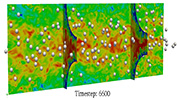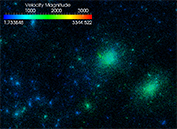Current Awards
Congratulations to our 2025-2026 Awardees.
ALCC awards support scientists from industry, academia and national laboratories advancing scientific and technological research in DOE mission areas including: Biophysics, Energy Efficiency in Aerospace and Combustion technologies, Fusion Energy, Geosciences, High Energy Physics, Materials Sciences, Nuclear Engineering, and Nuclear Physics.
Soumendu Bagchi (Oak Ridge National Laboratory)
Integrated Exascale Computational Workflows for Accelerated Material Synthesis
- 400,000 on Frontier
- 150,000 on Perlmutter-GPU
Michal Bajdich (SLAC National Accelerator Laboratory)
High-Precision Heterogeneous Catalysis by Quantum Monte Carlo
- 1,000,000 on Aurora
- 150,000 on Polaris
Thomas Blum (University of Connecticut)
Hadronic Contributions to the Muon g-2 from Lattice QCD
- 2,000,000 on Frontier,
- 2,000,000 on Aurora
Igor Bolotnov (North Carolina State University)
Nuclear Thermal Hydraulics Simulations Using Interface Capturing Approach
- 350,000 on Perlmutter-CPU
Jeff Candy (General Atomics)
Turbulence Database for Fusion Energy Science
- 300,000 on Frontier
- 300,000 on Aurora
Venkata Chaluvadi (GE Vernova Gas Power Engineering)
Massively Parallel Large Eddy Simulations for High-Efficient Gas Turbines Operating with Hydrogen and High Aerodynamic Loading
- 500,000 on Frontier
Jacqueline Chen (Sandia National Laboratories)
HyPowerGen
- 638,000 on Frontier
Ryan Coffee (SLAC National Accelerator Laboratory)
Real-Time Adaptive Disruption Forecasting at DIII-D
- 350,000 on Frontier
William Detmold (MIT)
Neutrino-nucleus Interactions from Lattice QCD
- 970,000 on Frontier
Patrick Emami (National Renewable Energy Laboratory)
Theseus: A Computational Science Foundation Model
- 160,000 on Perlmutter-GPU
Jun Fang (Argonne National Laboratory)
Development of AI-powered Application for Advanced Nuclear Reactor Design
- 100,000 on Aurora
Panchapakesan Ganesh (Oak Ridge National Laboratory)
Ab Initio Simulations of Out-of-Equilibrium Heterogeneous Quantum Materials
- 250,000 on Frontier
Xiang Gao (Brookhaven National Laboratory)
Transverse Momentum Dependent Helicity Distributions of the Nucleon
- 1,850,000 on Frontier
Vikram Gavini (University of Michigan, Ann Arbor)
Learning Correlation Functional in DFT from Quantum Many-body Calculations
- 290,000 on Frontier
Rafael Gomez-Bombarelli (MIT)
High-Throughput Multiscale Simulations for Designing Sustainable Copolymers
- 243,750 on Perlmutter-CPU
- 184,000 on Perlmutter-GPU
Ore Gottlieb (Flatiron Institute)
Simulating Large-scale Long-lived Neutron Star Remnants from Binary Neutron Star Mergers
- 667,000 on Aurora
Roelof Groenewald (TAE Technologies Inc.)
Validation of Stability Simulations and Predictive Scaling Toward Next Step FRC Fusion Device
- 250,000 on Aurora
Allan Grosvenor (Microsurgeonbot Inc.)
Space Traffic Autonomy: Leadership Computing Advances Hierarchical Planning R&D
- 685,000 on Frontier
- 685,000 on Aurora
Rajan Gupta (Los Alamos National Laboratory)
Axial-vector Form Factors for Neutrino-nucleon Scattering
- 550,000 on Frontier
Heidi Hanson (Oak Ridge National Laboratory)
Privacy-Enhanced Simulation and Risk Evaluation for Collaborative Learning at Scale
- 200,000 on Frontier
Katrin Heitmann (Argonne National Laboratory)
Cosmological Hydrodynamics for Multi-wavelength Cosmic Probes
- 350,000 on Frontier
Sara Isbill (Oak Ridge National Laboratory)
Informing Forensics Investigations of Nuclear Materials
- 300,000 on Frontier
Suhas Jain (Georgia Institute of Technology)
High-fidelity Simulations of Bubble-laden Turbulent Flows with Surfactants
- 1,000,000 on Frontier
- 1,000,000 on Aurora
Wei Jiang (Argonne National Laboratory)
Microscopic Insight into Transport Properties of Li-battery Electrolytes
- 600,000 on Aurora
Dheeraj Kapilavai (GE Aerospace Research)
Integrated and Detailed Simulation of Combustor and Turbine Interaction in a Jet Engine.
- 425,000 on Aurora
Kibaek Kim (Argonne National Laboratory)
Privacy-Preserving Federated Learning for Foundation Models
- 614,400 on Frontier
- 307,200 on Aurora
- 102,400 on Polaris
- 102,400 on Perlmutter-GPU
Mark Kostuk (General Atomics)
Pathfinding Integrated and Automatic Experimental Analyses for DIII-D Research
- 15,000 on Polaris
- 33,000 on Perlmutter-CPU
- 2,000 on Perlmutter-GPU
Emmanouil Koukoumidis (Oumi PBC)
Causal Online Alignment for Reliable Foundation Models
- 100,000 on Polaris
- 147,500 on Perlmutter-GPU
Taehun Lee (The City College of New York)
High-Fidelity Simulations of Helium-Air Mixing in HTGR Cavities and Thermal Stratification in Sodium Fast Reactors
- 70,000 on Polaris
Xiaocan Li (Los Alamos National Laboratory)
Plasma Turbulence and Particle Acceleration in 3D Magnetic Reconnection
- 750,000 on Frontier
Keh-Fei Liu (University of Kentucky)
Gravitational Form Factors of the Nucleon and Pion
- 284,000 on Perlmutter-CPU
- 193,000 on Perlmutter-GPU
Adrian Lozano Duran (California Institute of Technology)
Non-Equilibrium Rough-Wall Turbulence Database for Physics and Model Development
- 820,000 on Frontier
Massimiliano Lupo Pasini (Oak Ridge National Laboratory)
Scalable, Trustworthy, Energy-efficient Training of Graph Foundation Models for Material Design
- 200,000 on Frontier
Michael Mahoney (Lawerence Berkeley National Laboratory)
Compute for: SciGPT: Scalable Foundation Model for Scientific Machine Learning
- 376,000 on Frontier
- 300,000 on Perlmutter-GPU
Valerio Mariani (SLAC National Accelerator Laboratory)
A Codebook Language and Digital Twin Framework for Diffraction Data Analysis and Accelerator Operations
- 150,000 on Frontier
- 1,250 on Perlmutter-GPU
Alexis Marret (SLAC National Accelerator Laboratory)
Multi-scale Modeling of Ion Beams from Hybrid Laser-plasma to RF Accelerator
- 115,000 on Perlmutter-CPU
Ryan McMullen (Sandia National Laboratories)
Multiphase Mixing Induced by Interface Breakup
- 495,000 on Frontier
Daniel Mejia Rodriguez (Pacific Northwest National Laboratory)
Advanced Modeling for Two-Dimensional Materials and Transition Metal Oxides
- 275,000 on Frontier
- 275,000 on Aurora
Harshitha Menon (Lawrence Livermore National Laboratory)
Training Multi-modal Models for HPC Code and Data
- 300,000 on Frontier
- 200,000 on Aurora
- 200,000 on Perlmutter-GPU
Elia Merzari (Penn State University)
Toward Multi-scale Bridging for Thermal-hydraulic Transients: High-Fidelity Simulations
- 250,000 on Frontier
Parviz Moin (Stanford University)
Predicting Flow Distortions in Serpentine Engine Inlets
- 1,600,000 on Frontier
- 1,700,000 on Aurora
Peter Nugent (Lawerence Berkeley National Laboratory)
EMERGE: ExaEpi Calibration Runs and Surrogate Models
- 425,000 on Frontier
- 425,000 on Aurora
- 100,000 on Perlmutter-GPU
Ivan Oleynik (University of South Florida)
High Energy Density Physics of Novel Inertial Fusion Energy Ablator Materials
- 1,000,000 on Frontier
- 800,000 on Aurora
- 100,000 on Perlmutter-GPU
Jonathan Ozik (Argonne National Laboratory)
Probabilistic Comparative Modeling of Colorectal Cancer Screening Strategies
- 135,000 on Perlmutter-CPU
Bruce Perry (National Renewable Energy Laboratory)
High-fidelity Simulation of SAF End Use: Emissions and Operability Studies
- 600,000 on Frontier
- 300,000 on Aurora
Sylvain Pierre (GE Vernova Advanced Research)
Next Generation Turbomachinery Design Using Turbulence-resolving Large Eddy Simulation
- 660,000 on Frontier
Thomas Potok (Oak Ridge National Laboratory)
An Exascale Co-Design Framework for Spiking Graph Neural Networks
- 420,000 on Frontier
Russell Powers (Naval Air Warfare Center Aircraft Division)
Targeting Coupled Fan Motor Assembly and Wind Tunnel Circuit Improvements
- 380,000 on Frontier
Stephan Priebe (GE Aerospace Research)
Highly-Resolved Simulations of Turbulence in a Transonic Fan at Flight Conditions
- 757,000 on Frontier
Noah Reddell (Zap Energy Inc.)
Kinetic Plasma Model Investigation of Z Pinch Physics at Fusion Conditions
- 800,000 on Frontier
- 200,000 on Aurora
Nicholas Schwarz (Argonne National Laboratory)
Enhancing APS-Enabled Research through Integrated Research Infrastructure
- 10,000 on Frontier
- 150,000 on Polaris
- 10,000 on Perlmutter-GPU
Micholas Smith (The University of Tennessee, Knoxville)
Probing Lignocellulosic Biomass & Products via Large-Scale Molecular Simulation
- 24,000 on Frontier
- 1,000 on Perlmutter-CPU
- 143,456 on Perlmutter-GPU
Ionel Stetcu (Los Alamos National Laboratory)
Microscopic Fission Dynamics of Even-Even, Odd and Odd-Odd Nuclei
- 528,000 on Frontier
Thomas Wester (University of Chicago)
Enabling Exascale Discovery in Neutrino Science
- 150,000 on Aurora
- 50,000 on Polaris
Yiqi Yu (Argonne National Laboratory)
LES&DNS Simulation on Flow and Heat Transfer Behavior in Involute Plate Research Reactor
- 150,000 on Polaris
- 550,000 on Perlmutter-CPU
Zheng Zhang (University of California, Santa Barbara)
Tensor-Compressed Sustainable Pre-Training of Extreme-Scale Foundation Models
- 600,000 on Aurora
- 100,000 on Polaris
- 80,000 on Perlmutter-GPU











